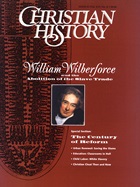On a gloomy March afternoon in 1829, 2,000 people crammed into the Assembly Hall in Edinburgh. They came in support of granting civil rights to Roman Catholics. But audience attention drifted after a series of tedious speeches by secular politicians. Then a clumsy, heavy-built, middle-aged clergyman rose to speak. The restless crowd was hushed, and within minutes, they were cheering wildly.
The uninspiring figure who produced such a remarkable effect was Thomas Chalmers, professor of divinity at Edinburgh University. Chalmers was no friend to Roman Catholic theology. In England and Scotland, he was a leader among evangelicals who in this age were decidedly anti-Catholic. Nevertheless he was convinced that religious error was no grounds for political disenfranchisement. Intolerance had become an "unseemly associate" of the Reformation, he argued. True Christianity could be spread only through preaching the Word of God, and political coercion was counterproductive.
At the time of Chalmers's speech, Anglicanism was the established religion in England, Ireland, and Wales (Presbyterianism was the established church of Scotland). Consequently, Catholics, Jews, and Nonconformists (Protestants who weren't members of the established church) were disadvantaged. In order to serve in Parliament, for example, Jews and Catholics were required to deny their faith. Nonconformists didn't have as many restrictions against them, but they were still the object of discrimination—they were excluded, for instance, from taking degrees at Oxford and Cambridge.
Speaking with strong feeling, Chalmers appealed to his audience, and through them to the politicians in London:
"Give the Catholics of Ireland their emancipation; give them a seat in the Parliament of their country; give them a free and equal participation in the politics of the realm; give them a place at the right ear of majesty and a voice in his counsels. And give me the circulation of the Bible, and with this mighty engine I will overthrow the tyranny of Antichrist and establish the fair and original form of Christianity on its ruins!"
Evangelical dilemmas
In the early 1800s, many evangelicals feared that civil toleration would only exacerbate the indifference to truth they believed infected England. But Chalmers, among others, championed a new idea: striving for political liberty and for spiritual truth need not be incompatible.
Nonconformists were the largest religious minority, and by the 1820s pressure from them was becoming irresistible. In 1828 the Test and Corporation Acts were repealed, thus guaranteeing their right to hold public office. (The attainment of full equality—in education, for example— would take much longer.)
Roman Catholics and Jews presented evangelicals with more painful dilemmas. Many evangelicals believed that tolerating those in religious error was the same as denying Christian truth. No one felt this tension more than William Wilberforce. He loathed Roman Catholicism and believed its influence was essentially evil.
Nevertheless he had become convinced by 1813 that "persecution for religious opinions is not only the wickedest but one of the foolishest things in the world."
Jewish emancipation was also a thorny issue. Lord Shaftesbury, for instance, believed that the Jews were God's ancient chosen people and that their conversion was an essential prelude to the Second Coming. But he felt it would be a denial of Christian truth to allow them to become legislators for a Christian nation.
But other evangelicals, notably Robert Grant and Lord Bexley, believed Jewish emancipation was a matter of civil justice and a necessary preliminary to conversion.
Eventually, through the efforts of magnanimous evangelicals and tolerant liberals, Catholic emancipation was enacted in 1829, and Jewish emancipation in 1858.
John Wolffe is senior lecturer in religious studies at The Open University in Milton Keynes, United Kingdom. He edited Evangelical Faith and Public Zeal: Evangelicals and Society in Britain, 1780-1980 (SPCK, 1995).
Copyright © Christianity Today/Christian History magazine.
Click here for reprint information on Christian History.

Support Our Work
Subscribe to CT for less than $4.25/month




























